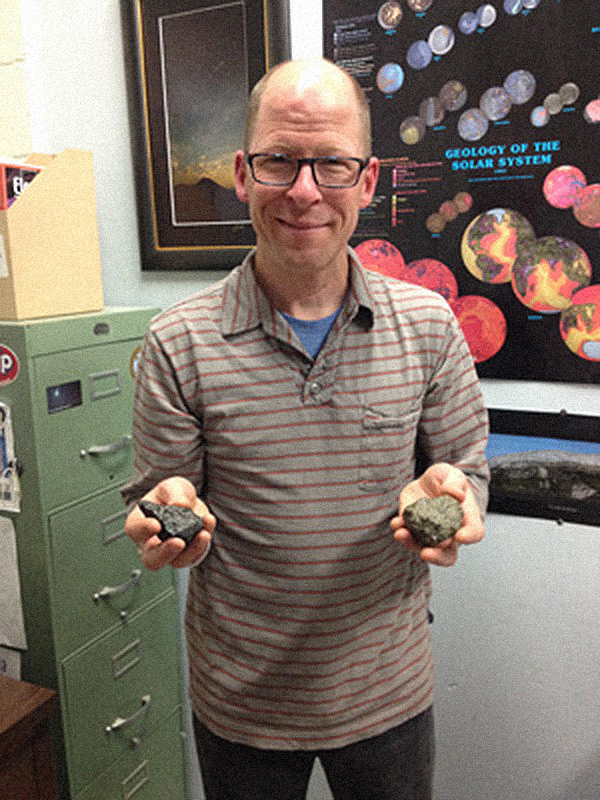BOONE, N.C.—From geology and more specifically to meteorites, there is a tactile connection to space and the universe that’s tangible even with one’s feet planted on Earth – or to be more exact, in Rankin Science Building. In a dusty room, covered with colorful geological maps, signs of research abound with samples of rocks and slides strewn about the room’s surfaces. Anthony Love ’99, research operations manager for the Department of Geology at Appalachian State University, shared two artifacts – a piece of the moon and a piece of Mars – while talking so excitedly about science that gravity might have been the only thing keeping him in his seat.
Several years ago, Love was approached by science enthusiast Don Cline, a member of Appalachian’s College of Arts and Sciences Advancement Council and a supporter of many campus and state science development initiatives. Cline asked Love about his passion, which is classifying and vetting unknown meteorite materials. Love described his work as defining how these materials taste, classifying their composition and sharing the markers of their story.
“The rock’s chemistry can tell us where it came from and how it formed,” said Love, who earned a bachelor’s degree in Appalachian’s geology program in 1999. “We may not have the tools here on campus to study isotope systems that would show the age of these materials, but we do have the instruments to study their origin and classification.”
Geology is the study of the origin and evolution of our planet, and meteoritics is the planetary science that studies the origin and evolution of our solar system. A meteor, also known as a shooting star, occurs when a piece of an asteroid or a planetary body enters the atmosphere. When it lands on Earth, it is called a meteorite.
“A meteor loses about three-fourths of its mass during atmospheric entry, so the rocks that make it to earth as meteorites have to be a certain size to survive their passage through our atmosphere,” explained Love. “To say all that is one thing, but to hold, to learn and think about that object in the palm of your hand is another.”
Love’s research involves taking thin sections of rock to evaluate their internal texture and the minerals in their makeup. The main differences in distinguishing a meteorite from any rock is magnetism and density. The specimen Love shared, hardly bigger than a quarter, was a piece of the moon’s surface.
“That piece came from the crater formations we can see in the moon,” said Love. “Those craters occurred from impact to the moon’s surface and broke a portion of the subsurface away and that is what you hold in your hand.”
Love was not always this passionate about meteorites in his geological studies. His interest in meteorites did not come about until 2006. His work now is summed up as the closest tangible opportunity to connect with space. Since then, opportunities have been presented with great encouragement and support from his fellow faculty and resources in the community. Having no further degree studies, Love has found these opportunities have come to him through great dedication, support and research. As he explains, his work isn’t necessarily categorized as science, but without classification of geological materials, scientists cannot do their research. For Love, it is the excitement of working with these materials and making these new distinctions that bring him to work every day.
About the Department of Geology
Located in Western North Carolina, Appalachian State University provides the perfect setting to study geology. The Department of Geology provides students with a solid foundation on which to build a successful career in the geosciences. The department offers both a B.A. and B.S. degree, with the option of concentrations in environmental geology, quantitative geoscience, paleontology and secondary education. Most students go into environmental consulting, mining, oil/gas or secondary education teaching (earth sciences or natural sciences), or enter graduate school.
About Appalachian State University
As a premier public institution, Appalachian State University prepares students to lead purposeful lives. App State is one of 17 campuses in the University of North Carolina System, with a national reputation for innovative teaching and opening access to a high-quality, cost-effective education. The university enrolls more than 21,000 students, has a low student-to-faculty ratio and offers more than 150 undergraduate and 80 graduate majors at its Boone and Hickory campuses and through App State Online. Learn more at https://www.appstate.edu.
What do you think?
Share your feedback on this story.












